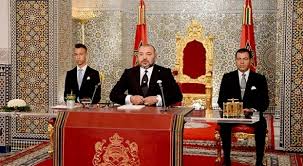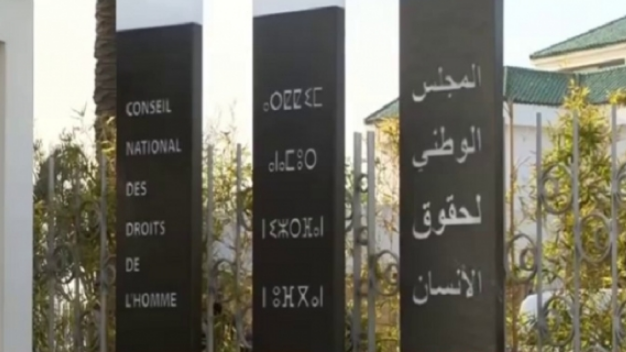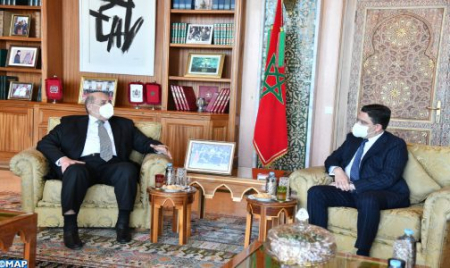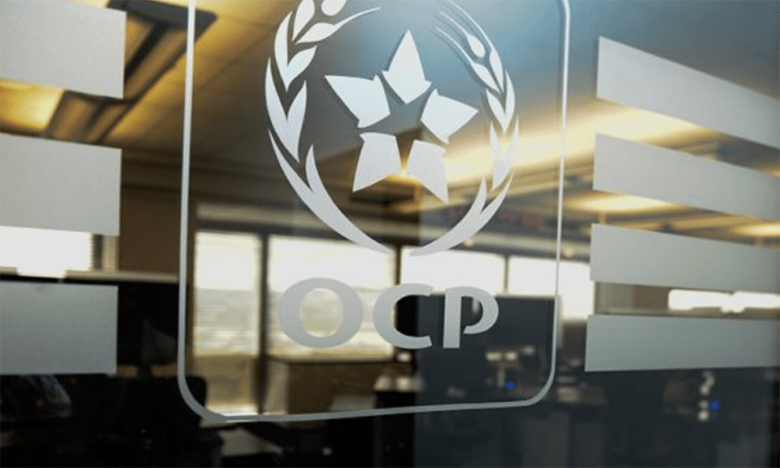 In a frank tone, King Mohammed VI delivered a speech on the occasion of the eighteenth anniversary of Throne Day drawing up the main obstacles to Morocco’s human and social development model and the factors hindering the full achievement of social justice and the rule of law in the country.
In a frank tone, King Mohammed VI delivered a speech on the occasion of the eighteenth anniversary of Throne Day drawing up the main obstacles to Morocco’s human and social development model and the factors hindering the full achievement of social justice and the rule of law in the country.
Underperforming civil service
In his speech, read out from the Northern city of Tetuan, the King strongly rebuked civil servants and public officials for their underperformance. The Monarch pointed out to the paradox that Morocco enjoys indisputable credibility at continental and international levels evidenced by the flow of investments by world giants such as Boeing, Renault and peugeot, to mention but a few, and the sluggishness facing social projects.
He drew a contrast between the dynamism marking the activities of the private sector, which attracts the country’s best brains, and the public sector which remains plagued by employees lacking skills, qualifications and ambitions.
“One of the problems which impede Morocco’s progress is the weakness of the civil service, be it in terms of governance, efficiency or the quality of the services provided to citizens,” deplored the Monarch.
The Sovereign gave the example of the low performance of regional investments centers, which has “an adverse impact on regions that are suffering from insufficient – sometimes inexistent – private investment and from the public sector’s weak performance. This, in turn, affects citizens’ living conditions.”
This further worsens regional disparities, noted the King notably in terms of “the biggest shortage of health, education and cultural services, not to mention the lack of jobs,” therefore, there is the need for “greater cooperative efforts” to close gaps and help these regions catch up with the others.
The King also called on local officials to “work hard,” like the staff in the private sector or even harder to “show a sense of responsibility that does credit to the civil service and yields concrete results since these officials are entrusted with serving citizens’ interests.”
Frozen political parties
The King went on to criticize political parties for failing to uphold their duties. He deplored that “the evolution witnessed in Morocco in the political domain and in the area of development has not led to the kind of positive reaction you would expect from political parties, leaders and government officials when dealing with the real aspirations and concerns of Moroccans.”
The Monarch rebuked the opportunism shown by politicians and officials who “vie for the spotlight to derive benefits from the achievements made, both politically and in terms of media exposure.”
He particularly expressed sharp disapproval of their tendency to hide behind the Royal Palace and ascribe everything to it, when matters do not turn out the way they should.
“As a result, citizens complain to the King about government services or officials that take too long to respond to their queries or process their cases, asking him to intercede on their behalf,” he went on to say, underlining that citizens are entitled to convincing answers within reasonable timeframes to their queries and complaints.
Ignoring citizens’ legitimate requests and queries pushes young people to shun political life and elections all together, King Mohammed VI said, adding, “Put simply, they do not trust politicians; indeed, some stakeholders have perverted politics, diverting it away from its lofty objectives”.
Linking responsibility to accountability
The Monarch stressed the need for officials to show responsibility in ensuring the achievement of projects that serve citizens whenever they are.
“Whether a project concerns a district, a hamlet, a city, a region or the entire country, it still has the same objective, which is to serve citizens. In the eyes of citizens, digging a well or building a dam, for instance, are equally important,” he said.
In this regards, the King put emphasis on upholding the Constitution notably the second paragraph of Article 1, which links public office with accountability.
“This is the dawn of a new era in which there is no difference between officials and citizens as far as civic rights and obligations are concerned; nor is there room for shirking responsibility or avoiding sanction,” he underscored.
In his speech, the King also examined the events taking place in some parts of the country, which “have regrettably revealed an unprecedented lack of the sense of responsibility,” alluding to the recent unrest in Al Hoceima.
He blamed political parties for failing to assume their responsibility, saying that “some political parties believe that all they have to do is hold their general meetings, those of their political and executive committees and get involved in election campaigns.”
The Monarch denounced the practices of partisan bickering and political score-settling, noting that “running public affairs should have nothing to do with personal or partisan interests, populist discourse, or the use of strange expressions that undermine political action.”
An ode to law enforcement services
In the face of the vacuum created by underperforming officials and political parties, “law enforcement services have found themselves face to face with the citizens. They have bravely and patiently fulfilled their duty, showing restraint and commitment to the rule of law as they maintained security and stability.”
The King commented on the situation in Al Hoceima and refuted “what some have referred to as the ‘security approach’, as if Morocco were sitting on top of a volcano, or as if each household and each citizen were being watched over by a policeman.”
“In reality, there is only one policy and a single, unwavering commitment, which is to enforce the law, respect the institutions, ensure the security of citizens and safeguard their property,” he made it clear.
He praised the work achieved by law enforcement officers in safeguarding the internal and external security and stability of the homeland, and protect the security, serenity and tranquility of citizens as well as their commitment to the rule of law.
Putting the interest of the homeland and citizens first and foremost
After praising Morocco’s institutional model, the King affirmed that there will be no backtracking on democratic achievements or the work of institutions.
“Officials must exercise their prerogatives without waiting for someone’s permission. And instead of repeating the same excuse – namely ‘I am being prevented from doing my job’ – it is better for them to offer their resignation, which nobody would reject,” he said, stressing that “Morocco must come first: before political parties, before elections and before senior positions.”
The King called for a new march to achieve human and social development; a march for equality and social justice for all Moroccans, “because such a major endeavor cannot be carried out in one region and not in the others.”


